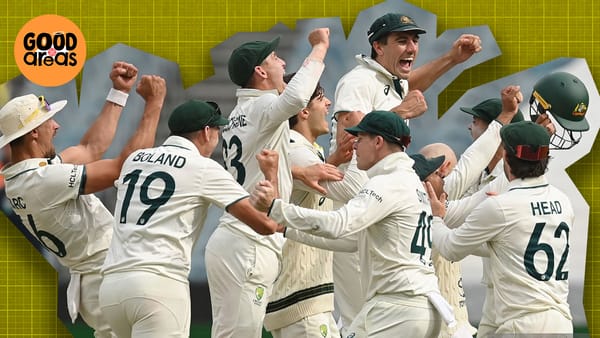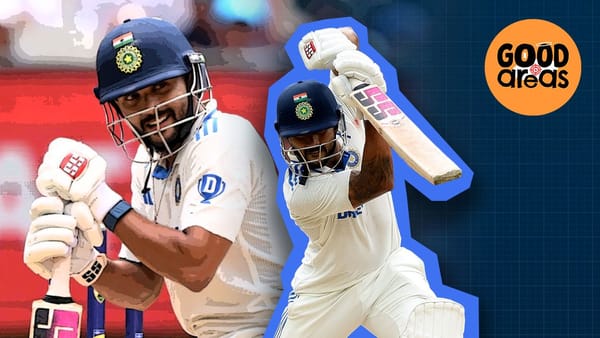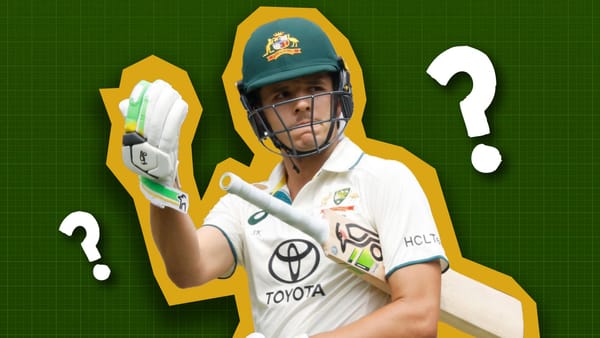England's 2-0 hangover
To overcome such an obstacle your need a lot of time and the greatest batter ever.
There was something kind of hypnotic about watching the England players play football in the rain. Almost trying to vibe the bad weather away.

Earlier, Jonny Bairstow had warmed up as it rained until the ground staff suggested they might need the covers on.

(Photo credit to Bharat)
And Brendon McCullum stood near the covers with a bat for fielding practice for an age, despite it raining. But even McCullum couldn't alpha the clouds around Old Trafford. Eventually, he put his bat under his jumper like a naughty kid and left the field.
The truth is, when Manchester wants to rain, it does. Often that is during important Ashes Tests. In 2005, England needed one more wicket, and Australia were trying to add to their last partnership when the rain had the final say.
In 2013, Australia were well on top, hoping to make their own 2-0 comeback when the rain ended that match.
And now we have this match. For the first time this series, a completely one-sided match is being played out, and England is stuck playing football and trying to suggest the conditions aren't that bad.
Essentially England were trying to Bazball the rain away. Broad basically said as much in his latest column. In the match, we saw Bazball break Australia; but it was sadly impotent versus Manchester weather.

Of course, the biggest issue was that they went two nil down.
There have been 54 teams who have gone down 2-0 in a five-Test series after the opening matches. Would you like to know how many have ever come back to end the series 3-2 up? One.
And that was a fluke that I will explain later.
So essentially, in the 53 normal situations where cricket was played in a five-Test series, the team lost.
Weirdly there have been many occasions where a side has come back to level the series at 2-2 but lost the series.
The first one was 1894/95, which was remarkable. England won the first match when Australia made 586 to start the game, enforced the follow-on, then needed 177 to win, and lost by 10 runs.
The second match was just as weird; England was rolled for 75 when they batted first, Australia did a little better to get a lead, then England exploded for 475, and Australia ended up around 100 short.
So after two matches, Australia was down but certainly had two chances to win. And they did in the third and fourth matches by a combined total of an innings and 529 runs to level the series.
Then in the last match, they set England a huge chase of 297, and a Yorkshire batter named Jack Brown passed 50 for the second - and final - time of his Test career to make 140 and win the game for England.
It remains one of the most remarkable series ever; Australia could have won five nil and ended up losing.
South Africa came back against England in 1955. England won the first match easily, but the next two were close, England going up two nil, and then South Africa just getting up in the third. Then South Africa scored huge in their second innings to tie the series. Before missing out in the last messy low-scoring match. Fair to say these were pretty closely matched teams.
India went two nil down against the West Indies in 74/75. Their batting was quite weak, but their spinners started taking a few more wickets and clawed back into the series. But the West Indian batters made 600 runs in the final Test to blow them out.
India again went down 2-0 in 77/78 against Australia. But this was a better Indian team and a horrendous Aussie lineup because of World Series Cricket. India should have stolen one of the first two matches. Instead, they lost by 16 runs and two wickets. They came back hard in the next two, winning by an innings in one and 222 in the other.
Then in the final Test, they let Yallop and Simpson make a bunch of runs. And they had to fight back all the way through. In the last innings they were set 493 to win; not a single player made 100, but everyone made runs. They had a late collapse that ended with them being dismissed for 445. Like Australia in 1884/85, India were probably the better team. But losing both close games upfront cost them.
Weirdly enough, no teams came back from 2-0 to even the series 2-2 only to draw the final game.
But the main point here is that even being the better-performing team doesn't help much once you go 2-0. You put yourself at the mercy of a toss, wet wicket, overhead conditions, a drop catch or rain.
When in doubt, I say always try not to go 2-0 down in a five-Test series.
On the Ashes themselves, I have now found the entire retaining issue quite weird. Like in 2019, I remember finishing my work and hearing how hard the Australians were partying, and my first thought was, do they realise they could still draw this series?
Surely winning the series means more than retaining the Ashes. In almost every other series in cricket, the most important thing is winning it. But retaining the Ashes takes precedence over actually winning the series.
Pat Cummins mentioned that for this series. He didn't want Australia to retain; he thought they gave up a chance last time and wanted them to win.
We've already had one Ashes this year where the Australian win was retained, but the series was a draw. And it felt a little hollow.
For England, though, once they went two nil down, it meant they needed all three to win and regain the Ashes. Australia just needed a win or a draw in three Tests. Semantics be damned.
But how did England go down two nil in two close Tests? Especially considering the Australian team really hasn't fired yet. It's been - at best - a patchy series for the Aussies.
At Edgbaston, England declared on day one that they could add another 20-40 runs. While that is the big one, their second innings was a bit odd. They lost early wickets, then their big boys didn't fire. They batted quite slow - by Bazball standards - and limped a little, which means that Australia didn't have to chase as many as they should have.
They also made comical errors through the game, wickets from no balls, Harry Brook forgetting to look where the pill had gone, and gifting extras.

Yet they were in front pretty much the entire way through, and so they still had a good chance to win the match. All England had to do was close out one of the weakest tails in a generation. But they couldn't use their spinner because one was hurt, and instead of picking a match-ready tweaker, they went for Moeen Ali.
Cummins actually prefers spinners in Tests, but he can't score from them. And he needed to make runs. Instead, England used Root and tried bouncers until Australia won. The only time they were in front in that game was in the last 15 minutes.
England were never in front at Lord's. They got the ball to move around early on, but David Warner made a 50. Usman Khawaja faced a load of balls, and Australia ended up with a decent first innings on the back of Smith.
Yet England was fighting back pretty well when they lost a bunch of wickets from over-attacking towards the end of the second day. That continued the following morning. And even as they kept themselves in the match by bowling nothing but short stuff for hours, their chase was still tough.
It wasn't made any easier by Bairstow's mistake, and really Stokes made it look - and certainly feel - closer than it was.
What about at Old Trafford? I would say England has been smarter in using Bazball as this series goes on. But they didn't use it to score as fast as they could or declare early to give themselves as much time as possible to take the ten wickets. (They scored quite quickly, but they could have bazballed further). They knew they had a lead, and they needed time. Instead, they batted on longer than anyone expected, and also then bowled with a slow over rate as well.
Declaring earlier was riskier, but with the weather coming, they needed it.
So we have ended with this weird situation where this series started with England declaring too early and then too late. Too much Bazball, and then not enough.
But England had the best of day five at Lord's. And since then, they've been by far the better team. I am listing the mistakes that led them to be 2-0 down. But I could have one of Australia's as well.
But if you have Australia as marginally better at Edgbaston - which is very debatable - but let's give them that. They were slightly more in charge of the Lord's game. But then slightly behind in the Headingley. And England were massively on top here. So England has been the better team overall if you want to look at it that way.
That is well and lovely, but it's not how these things work. There are no moral Ashes or vibes Ashes; there is just the one where England is 2-1 down and cannot win the series.
Remember that one team had won a series when being 2-0 down, that was Australia in 1936/37. England had the better of that game, despite everyone thinking they were going to get destroyed. Ernie McCormick, the Aussie quick, had lots of back pain which helped England score big, and they set Australia 381 to win. The wicket got wet before the Aussies went out, and they managed 58 runs. Ouch.
England made a decent first innings in the second Test, then declared when the wicket was wet, and Australia were blown away. They did ok in the follow but the match was completely over by then.
Now, there are two things I want to tell you about this. One is these were timeless Tests, meaning that rain was far less likely to draw a match. Meaning that England needed to win the remaining three matches.
Australia won the third Test on the sixth day, which was actually the seventh day because they had a rest there. But they also had a shot in the arm as they picked their legendary left-arm wrist spinner Chuck Fleetwood-Smith.

Chuck took a ten-wicket haul in the fourth Test to win the game for Australia.
He and Tiger Bill O'Reilly - the world's best bowler at this point - teamed up for 12 in the fifth match to win that as well.
Australia won the last three Tests by a combined total of an innings and 713 runs. It would be hard to say that Australia were not the better team.
But I have overlooked one thing here. Don Bradman played in this series. He made 83 in the final innings of the second Test. But by that stage, the match was already long gone. So essentially, he made 38 runs from three innings, and then he went nuts.

But let's just put it this way. In the first two losses, he made 121 runs. In the three wins, he made 689. In five innings.

It was the eighth most runs ever in a series, despite forfeiting his first few goes. But how about this? I have marked a Brian Lara series here where he scored 688 against Sri Lanka in a three-Test series. That is the record for a small series, and Bradman beat it by a run in his last three attempts.

So the only way to come back from 2-0 down in a Test series and win is to have timeless Tests that mean you're far less likely ever to have a draw. Or have the greatest batter of all time playing three straight innings that completely break the opposition.
For the record, Manchester has had 32 entire days washed out for Tests. The most of any Test ground ever. And they tower over the second worst, which is the SCG. If you need three results to stay alive, there is no worse place to turn up.

England will not lose their chance of winning this series because of the rain. They will be in this situation because they made errors in two close contests that hurt them. They probably had the better of the conditions over those first two matches, they planned well for the Aussie batters and limited the impact of Hazlewood and Boland, but they dropped catches, declared weirdly and were sloppier in key moments.
Over the entire four Tests, England have played the better cricket. While people are focusing on the attacking batting, England have looked smarter. And as the series progressed, they lessened their errors, and got even smarter yet, and Mark Wood was snorting adrenochrome.

But the truth is, whether it is luck, or bad play, once you are 2-0, everything has to go right. The toss, the conditions, the bounce of the ball, and also the weather.

To win from 2-0 down, you need a timeless Bradman, and England had a soggy Bazball.




